Vancouver house price bubble deflates 14th month in a row. Toronto matches 2017 peak. Calgary, Edmonton beaten up by oil bust. Quebec City flat for 6 years. Montreal, Ottawa hit new highs.
House prices in Greater Vancouver – in its glory days not too long ago, one of the world’s hottest housing bubbles – dropped another 0.5% in September compared to August, the 14th month-to-month decline in a row, and were down 7.4% from the peak last July, according to the Teranet-National Bank National House Price Index. House prices had more than quadrupled over the 16-year boom from January 2002 through July 2018. The index is now back where it had first been in August 2017:
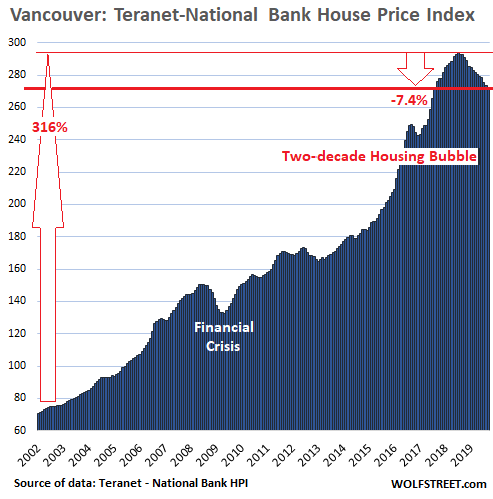
Toronto:
In the Greater Toronto Area, house prices had more than tripled (+218%) since 2002 – compared to Vancouver’s quadrupling over the period. In September, house prices were essentially flat compared to August, were up 3.9% from September last year, and matched the prior peak of July 2017:
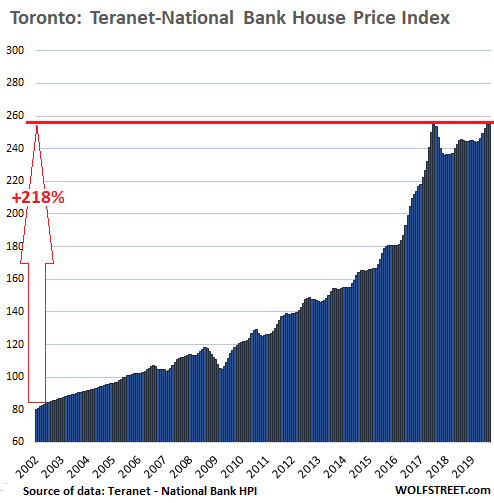
Toronto’s chart above and the charts of all other markets below are on the same scale as Vancouver’s chart to show the house price increase in each metro in proportion to the increases in the other metros, and particularly in proportion to Vancouver.
Each of the markets has a unique profile, and no market can match the 17-year craziness of Vancouver, but some markets had short and stunning increase somewhere in between. And some markets are below where they’d been years ago. As we go down the list, to markets with smaller and smaller house price increases since 2002, the white space on each chart gets larger and larger.
The Teranet-National Bank House Price Index tracks prices of single-family houses via “sales pairs,” where the price of a house that sold in the current month is compared to the price of the same house when it sold previously, often years ago (methodology). This eliminates the issues of “mix” that skew median-price indices and the issues of “big outliers” that the skew average-price indices.
Victoria:
House prices in Victoria, which also more than tripled since January 2002 (+224%) were essentially flat in September compared to August and July, but at record level, and were flat year-over-year, despite a dimple last winter (chart is on the same scale as Vancouver’s):
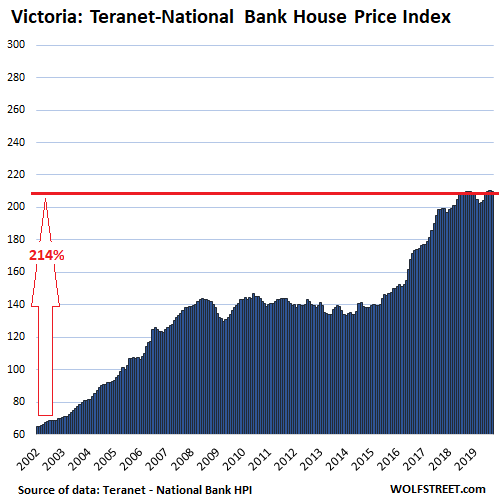
Winnipeg:
In the Winnipeg metro, house prices rose 0.6% in September from August and eked out a new record, having surpassed the prior record, set 12 months ago, by 0.5%. Note how the index had nearly tripled between 2002 and September 2014, but has since flattened out:
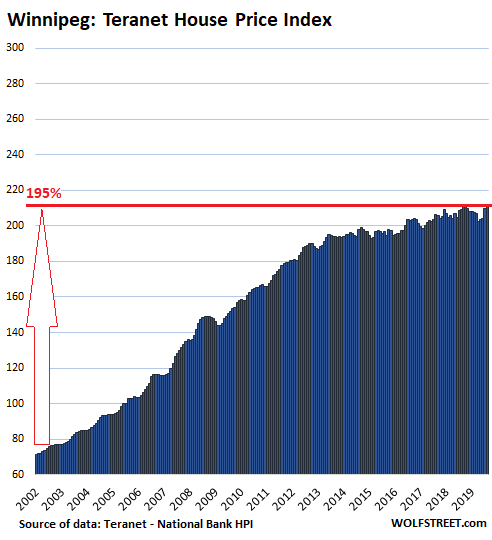
Quebec City:
House prices in the Quebec City metro fell 0.7% in September from August, were down 1.1% from the peak in July, were flat year-over-year, and were essentially flat since June 2013, after a ludicrous gain of 160% in the prior 12 years:
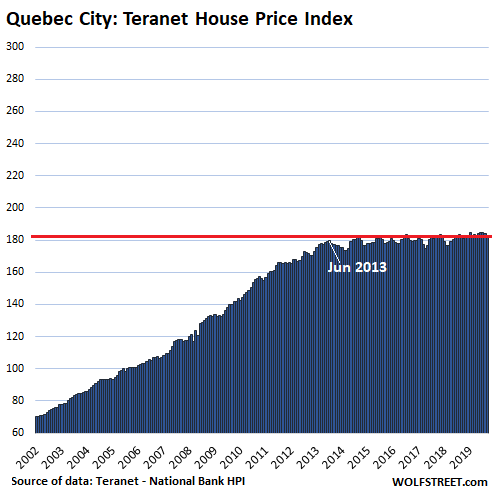
Montreal:
The House Price Index for Montreal rose 1.0% in September from August to a new record and was up 6.3% from September last year. The index has risen 170% since 2002 with only some seasonal fluctuations, and without getting tripped up during the Financial Crisis:
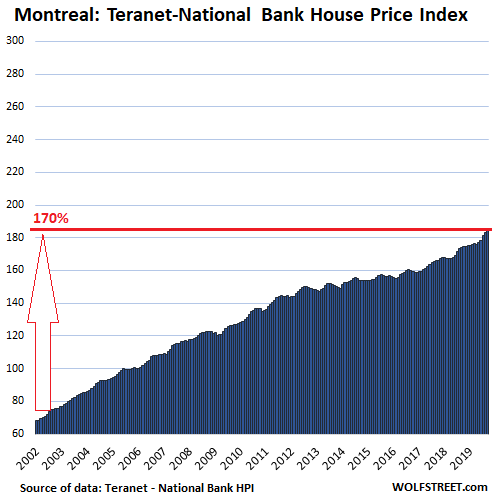
Oil Boom-and-Bust:
House prices in Calgary and Edmonton are a function of oil booms and busts. Now is the bust. But during oil booms, veritable miracles happen whose hangovers are painful and last many years. In the two-year period during the oil boom before the Financial Crisis, the index for Calgary skyrocketed 78% and for Edmonton 87%. Then, inevitably came the oil bust.
In Calgary, house prices rose 0.2% in September from August to where they’d been in March 2014 level, but remain down 1.9% from September last year, and down 5.7% from the peak in October 2014:
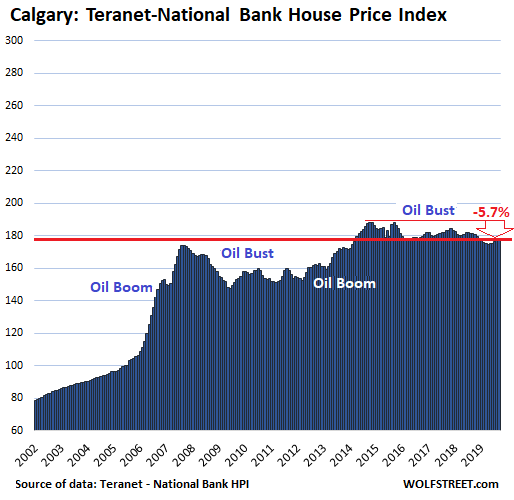
In Edmonton, house prices were unchanged in September compared to August and July and were down 3.1% year-over-year and down 5.9% from the mind-blowing peak in October 2007:
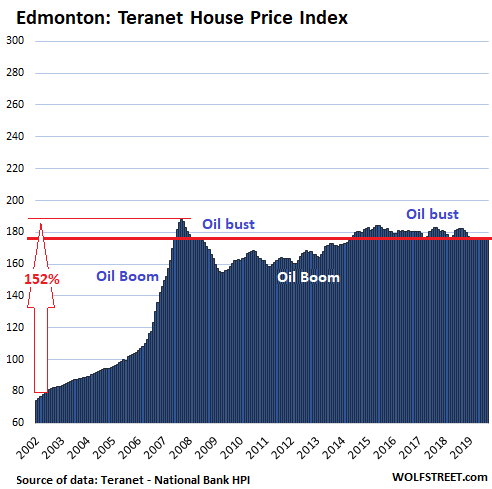
Ottawa:
House prices in Ottawa rose 0.8% in September from August to a new record, and are up 7.1% from September 2018. Since January 2002, the House Price Index has risen 120%, which is a significant increase by any measure, but compared to the other housing markets in Canada, particularly the enormous bubbles in Vancouver and Toronto, Ottawa ranks in last place on this scale in terms of price gains since 2002:
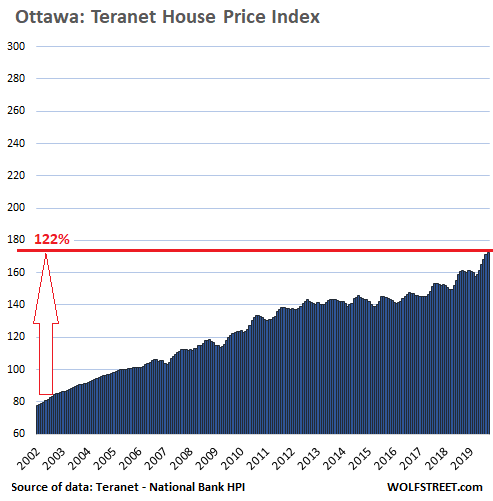
A measure of house price inflation
The Teranet-National Bank National House Price Index tracks how many more Canadian dollars are required to buy the same house over time – the sales pair method. When the prices of the same houses double over the years, it’s not because the houses got twice as big, but because the purchasing power the Canadian dollar has declined, and now it takes twice as many dollars to buy the same house. This “sales pair” method makes the index, and similar indices, such as CoreLogic Case-Shiller Home Price Index for the US, a measure of house price inflation, which varies from market to market.
In the nine-county San Francisco Bay Area, house prices dropped 5.4% in September compared to a year ago and are down 16.2% from the peak in May 2018. Ironically, house prices dropped the most in Silicon Valley. Read... Housing Bubble in Silicon Valley & San Francisco Bay Area Turns to Bust Despite Low Mortgage Rates & Startup Millionaires
Enjoy reading WOLF STREET and want to support it? You can donate. I appreciate it immensely. Click on the mug to find out how:
![]()



Is it a bubble If the prices never drop?
It’s a bubble if prices are out of whack with economic reality. At some point, prices adjust to reality. See Vancouver.
I think Vancouver is still a long long long way from reality.
But I get your point. I just would’ve picked a different example.
Yes. Bu the adjustment process takes time. It’s a process and doesn’t happen all at once. There are many ups and downs, and in RE tends to go on for years. When I said “See Vancouver” I didn’t mean as an example of “reality” but as an example of “adjust to reality.”
Wolf, Reality is a crutch.
Trust me, I’m a Realtor.
Nothin’ but blue skies and good times ahead!
Of course you will say that , seller
Manue,
I’m afraid you totally missed Tom Stone’s biting and bone-dry sarcasm. I know Tom. He’s been around here for a long time. And I worked with him on pinpointing the turning point of the housing market in Sonoma County in the summer of 2018.
Check out our first piece in the series:
https://wolfstreet.com/2018/08/13/housing-market-inflection-point-bay-area-sonoma-county-supply-volume-price/
WR,
For me, a good measure of a bubble is to look at the ratio of income to housing costs.
And incomes haven’t gone up anywhere near 4x in V – or anywhere else in NA for that matter.
What *has* happened is endless interest rate suppression via money printing by a corrupt dying government (US) – which creates unsustainable RE bubble after bubble.
Can anyone please explain to me what the F*** is in “Winnipeg” (crime capital of Canada) to justify such a huge price gain???
Budget oil field offices, but mainly transportation and warehousing. Fills the gap between Calgary and Toronto for cross country freight.
They still manufacture a lot of stuff there. 15,000 employed in aerospace alone…
The stats in our media reports differ. Excuse the weird format but it is cut and paste which doesn’t always work too well….
“Current Vancouver MLS® stats indicate an average house price of $1,273,504 and 1,269 new listings in the last 28 days. As of today, Vancouver housing data shows median days on market for a home is 24 days.
Vancouver Housing Prices
Current (Sep 18 – Oct 16)
Past (Aug 21 – Sep 18)
$1.3M
Avg sold price
Monthly change 8.8% UP
Quartely Change 12% UP
Yearly change 0.7% Down
On the news the other day it was said that prices were up almost to highest levels.
On Vancouver Island expensive Victoria has stalled, but other venues are still pretty active. In my rural area it seems that sales have stalled, although I just noticed a new sale today.
regards
Correct, sales are dramatically up in Vancouver the last months but prices are soft. There are about 800k dual Canadian citizens in Hong Kong that in all probability will come to Vancouver if things continue to turn sour there. This might keep the prices elevated and maybe what we are seeing now with the sales dramatically up is a sign of those Hong Kongers coming back.
This article has been posted to the “Metro Vancouver Housing Collapse” Facebook forum; feel free to join and share in the information/discussions along with 7,768 others since 11/11/17.
Take your farcebook and shove it up your zuckerbung.
Thank you wolf for bringing out the reality of Vancouver houses on street that have been trying to sell for the last year there are seven houses for sale on the street alone houses that were over 3 million or around 2.2 million now if they can get fired the reality is different from what the real estate board is putting you’re definitely right it’s the beginning of the crash and we should see 40 to 50% decline in the next 2 to 3 years perhaps even more I think the house that sold for 2.8 million at its peak will be selling for 800,000 within the next few years the money from China is dried up a lot of the condo buildings for rent signs on them now reality is Airbnb rentals can only support so much we are in for a cyclical bear which may take another 10 to 15 years to get back perhaps more we may never see the high prices again my greatest fear is when interest rates start increasing
Median household income after taxes in Vancouver was $73,000 (CA) in 2017 – from census data. That is about $54,000 (US).
Listing prices of homes are not always the same as sales prices.
There are new landlords in Vancouver who may have miscalculated their break even analysis.
Vancouver and San Francisco real estate markets have downside risk.
Census data does not pick up unreported income in the cash economy or abroad. It would be interesting to compare reported income in expensive neighborhoods vs the cost of maintaining homes in those neighborhoods.
They failed to report some of their income to the tax authorities (tax evasion), then exaggerated their income on loan applications to get bank loans (bank fraud).
If you add tax, insurance, maintenance I would guess the carrying cost of residential real estate is at least 3% even if you pay cash. If you finance say it’s another 4%. That’s 7%. The numbers only work on a trophy property when prices are going up.
The Canadian economy and thus our housing market depends upon the US economy. As long as you guys buy stuff from us, and use our services, things will be OK up here. However, if the US economy rolls over well….imagine a sleeping elephant rolling over on a mouse….that mouse will be us….
The possibility that things will roll over is more remote than the possibility that things will change. Change can occur slowly, or quickly. Right now the anticipation of adverse climate change effects is running ahead of the event. There is also a possibility in a base change to the way the economy functions. America is in a period of decline, cyclical or secular, we cannot be sure. Forget the lower dollar what if money as a store of value no longer plays a role? Keep your eye on the sparrow.
@AB America in decline? Yeah, some parts of USA hegemony are over. But, I just spent a week backpacking across Croatia and looking at folks (locals and other tourists) T shirts and listening to the music played in restaurants, there is essentially zero entertainment business / culture that is not USA (Anglo-sphere) driven.
I didn’t see one T shirt showing heartfelt devotion to a Russian or Chinese band or movie or tv show.
I may be very pro gold vs USD,
but who’s a seller of USA entertainment culture and then a buyer of exactly “what” to replace it?
.
Real Estate is just another risk asset, period. There’s nothing special about it. You can win or lose.
Your data spans 17 years… Just a rough back of the envelope conservative calculation shows prices increasing around %12.5 per year. And yet that %2 inflation Target seems just out of reach….
I understand this is Canada and large metro markets but still yet I surmise that U.S. metro markets would show similar numbers.
We used to call this pissing down someone’s back and telling them it’s raining.
Shizz,
No need to “surmise” about the US markets. Here are the charts:
https://wolfstreet.com/2019/09/24/the-most-splendid-housing-bubbles-in-america-september-update/
https://wolfstreet.com/2019/09/25/less-splendid-housing-bubbles-crushed-markets-chicago-dallas-minneapolis-charlotte-atlanta-detroit-cleveland/
Same quick and dirty calculation shows 6% YOY price increase in US metro markets. A far cry from %2.
US data has a lot wider range though.
Canada goes from strength to strength, plus its an extremely immigrant friendly nation. Canada attracts both high net worth and highly educated. This will keep prices high for decades.
See Vancouver.
And they don’t tolerate illegals.
And you need a National ID to vote.
Hmmmm
Illegals are courteously greeted at the border (after they throw away their cell phones and ID) by the RCMP, who are often seen helping them with their baggage. Thousands a month. A big source is the mainline from New York state, with non-stop taxi service to the border. They fly from Africa to New York, and often have big bucks in USD cash. Another source is South and Central America, with a stop in Mexico; there is no visa required if you fly from Mexico. There is a park in BC bordering the States where Chinese walk through a park and are picked up by a van to be driven to Vancouver. Also, Trudeau needed a vote in the UN from Romania, so after the previous government had stopped the flow of Roma claiming refugee status by requiring visas, Trudeau lifted the visa requirement from Romania which I suppose makes the government of Romania happy. We now have flocks of old peasant women begging on the street, all with similar hand-lettered signs – the only difference is how many kids they claim to have.
The government(s) now put them in hotels, motels, and shelters intended for homeless, for years. In Toronto, they are erecting giant Circus Tents to house people in commercial areas, presumably hoping nearby homeowners don’t notice. The excess numbers coming through Quebec are off-loaded to Toronto by the feds.
You can imagine how any criticism of this is treated.
High net worth and educated means you stand a good chance of being rejected if you apply for immigration the proper way. Such people have a tendency to vote wrong, especially if they’re fleeing Europe.
The government found almost 200,000 on the voter’s lists, supplied by the Liberals, that were not citizens, and that’s just what they claimed to have found.
Paying the media hundreds of millions of dollars in subsidies (to help the media compete), into the billions if the CBC is included, helps keep the criticism moderated. All the scandals are explained as not-scandals.
When I voted, I was asked if I wanted my voter’s card back. Why would I want that? Vote early and vote often?
Honestly man, quit with the conspiracy theories. Canada gov deports way more refugees than they accept. But anyway, the Liberals have to play ball with the NDP now that they have a minority government. Interesting times ahead.
Nicko2:
2019: documented reported facts, statistics, and verified evidence by observation = conspiracy theory.
It really is a special world now.
All these bubbles everywhere, yet all of them seem to be in the process of the slowest topping/deflation ever. What is taking so long? I know things don’t “go to heck in a straight line.” But at this rate it’s going to be years. Yet everyone can see that it’s happening. So why doesn’t it get there quicker?
In Canada the Vancouver bubble is rolling from city to city with about a 2 year span in between, from what I hear. It was Vancouver, then Toronto, now Montreal and even Nova Scotia. It’s a rolling bubble because the average new working Canadian can’t buy into the already too high markets.
Presently Montreal and Ottawa moving to Halifax, Moncton and Prince Edward Island.
Just to clarify, I was commenting not just about Canadian real estate, but almost every asset class in every market everywhere in the world. From art to wine to real estate to bonds to stocks, etc. (One of the few markets seemingly not in a bubble seems to be precious metals, ironically.)
Are high house prices in Vancouver attributable in part to low property taxes?
I just ran a $2,000,000 home through an on-line RE tax calculator and the annual tax was only $6,000.
Where I live, the annual RE tax on that property would be $25,000.
Can anyone confirm RE taxes are that low in Vancouver?
Answer is here:
https://www.bloomberg.com/news/articles/2019-04-16/the-taxes-that-sent-vancouver-s-luxury-housing-market-reeling
Iama
That is a good news story (imho) and explains the attempt to tame foreign speculation that drives up prices beyond where they should be.
In the news last week some lady who owns a home in Sydney BC (think Victoria) was assesed the luxury 2nd home tax and she was bitching all over the place because she was Canadian, but lived for 1/2 the year in Texas. She didn’t think she had to pay the tax and hired a lawyer. So if you cut through the whine, she spends summers on Vancouver Island and winters in Texas…the best of both worlds. Plus, she would be able to retain her BC medical coverage. Sounds like a luxurious lifestyle to me. And, the home value increases every year and if she moves in for awhile before she sells she won’t have to pay capital gains. Meanwhile, her empty house adds to the housing crisis that people demand Govt to fix.
The 2nd home tax rate is long overdue, imho.
My Canadian grade school and high school classmates told me they have to spend AT LEAST 6 mos in Canada in a year or else they don’t get their health care benefits? How does this work?
Since we are retired, it limits their long term travel plans.
Bobber,
I cannot speak specifically to YVR but I would think your example is low. It varies a great deal from market to market, BUT on whole property taxes are much lower north of 49 and there area few reasons for it.
If you choose to live in a state with no personal income tax, or sales tax, then some other hostage will pay the bills for services that citizens demand. Guess what, BC has both sales and income tax. Plus, our transport fuel is more expensive (taxed) to help pay for road const and maint, transit, and to reduce carbon emissions. We have a larger public safety net, and free single-payer medical coverage as well. All this requires Provincial sales taxes and Provincial income taxes + gas and sin taxes.
BC property taxes pays for most of the the school system, plus all local services including local road maint, fire dept, local govt services, etc. Local Govt also get provincial grants and federal grants for specific projects.
“School tax is one of the services you are charged for on your annual property tax notice. The tax isn’t based on whether you or your family use the public or private school system. The education system benefits all B.C. residents including people without children in school. You pay school tax to share in the cost of providing education in B.C.
If your property is located within a municipality, you pay school tax to your municipal office. If your property is in a rural area, you pay school tax to the province’s Surveyor of Taxes.
School tax is charged on every property in B.C. unless the property qualifies for an exemption.”
source: https://www2.gov.bc.ca/gov/content/taxes/property-taxes/annual-property-tax/school-tax
other info source: https://law.freeadvice.com/tax_law/property_tax_law/property_tax.htmcal roads and maint, fire protection, water, etc.
There are several advantages to this system, imho. By Law, local BC Govt at all levels are not allowed to run deficits. If there is an overrun, it is carried forward and has to be dealt with. This Includes Pension Obligations!!! So, there are no horror stories about pensioners being cut back when retired, or angry groups pitted against each other at tax time for initiatives. Plus, with Education K-12, the field is level. A student in Iskut (northern BC) has the same education and resources as a child from Vancouver. Parents can raise extra funds, but not to underwrite the costs of programs or curriculum. Private schools also receive 50% of the public schools per pupil ‘education funds’, although they do not receive money for maint, capital, bussing, etc. It is for curriculum, only. If a private school deviates from the curriculum, (say a religious school for an example) they lose the grant. Their choice. This ensures poor areas have good schools and their teachers are paid well as per union agreements. This also helps to limit the ‘haves and have nots’. It is illegal for schools to charge shop fees, art fees, etc. Lots of field trips are done with fund raising activities. There are NO paid coaches or subsidised sport programs. Coaching is by volunteer.
My taxes are $900 per year in my rural area. Garbage pickup is mandatory and an extra $135 per year. We have a drilled well for water and a private septic system so no sewerage costs. The local fire dept is volunteer with a somewhat paid ‘Chief’. A good friend of mine has an 800 -850K house in Campbell River (a city of 40K 1 hour from me). He has a spectacular view, city sewer, water and garbage billed on top. His taxes are $7,000 per year. His house in YVR would be worth 4-6 million? More? There is also local bus service 7 days per week paid by BC transit so I have no idea why his taxes should be any more than someone in YVR as a ratio to value. When someone turns 65 taxes are further reduced by the homeowner grant.
“The home owner grant reduces the amount of property taxes you pay each year on your principal residence. If you’re a senior aged 65 or older, your property is assessed at $1,650,000 or less and you meet certain requirements, you may be eligible for the additional grant of $275 on top of the regular grant of $570.”
I think each state is different, but in North Carolina taxes vary by county and city. We have 100 counties. Last time I checked roughly 1/3 of taxes was for education, 1/3 for social services and 1/3 for everything else.
The lowest taxes appear to be in rural areas that have a lot of retirement communities as there is not much need for schools or social services. There are some good locations with tax rate around 0.5% of property value. Pretty easy to find a new 3Bed 2 bath in a safe area for about $1000 per year taxes.
I can confirm that the Chinese only buys in cities with the lowest property taxes compared to the value of the real estate in Canada. That will never change the universe will end first.
All those rising graphs are indications of how fast the central banks have been running their money printing presses.
Once a building is built, mother nature immediately starts working to reduce it back to its original state; a pile of dirt.
Houses do not go up in value, they decline in value.
Houses only appear to be going up in value because the value of central bank money is going down faster than the decline in housing values.
The great “illusion” of our times.
The Canadian Banks, such as the Royal Bank of Canada seem to be doing well. The banks have been a short-killer for months now, although they seem to take their cues from the S&P.
Anyone have any clues as to when the Canadian Banks will begin to roll over? I’ve read numerous articles over the last year about ‘Now is the time to short Canadian banks’.
When the Bank of Canada starts cutting rates.
Also dont forget why people like Canada and want to live here
-Clean water and air
-very few guns
– no nuclear weapons
– a great health care system
– excellent highways and transit
– beautiful scenery
– mostly polite people
– expanding internet and telecom
– we use plastic folding money and $1-$2 coins
-stronger beer
Why do people leave Canada?
– snow
JohnnyG,
“-stronger beer”
You better come down here and do some serious beer tasting. And to make this beer-tasting easier and more fun, I have — you guessed it — just the mug for you, the Wolf Street mug, pictured above in the article, the “Nothing Goes to Heck in a Straight Line” mug, which you can get right here and which you can fill up with the strongest beers that the 7,000+ craft brewers in the US brew:
https://www.wolfstreetstore.com/
To to add two more to your ‘leave’ list:
– better job opportunities in the US
– higher pay in the US
my own 2019 informal Vancouver island survey suggests, since 2009 rents are up 150 percent and wages are up 50 percent. . .result? more people living in cars and tents–and nurses driving around in Mercedes SUVs.
even garages are charging can$110 a hour. . .screw that i’m back in mexico.
My brother always worked in construction mostly as a manager. He has a lovely large home, but he has architect’s disease. He has been remodeling his home off and on for 30 years. He currently has a crew removing all the popcorn ceiling and replacing. The contractor used to make a living spraying popcorn ceilings and now makes a living removing them. It is a true statement that homes go out of style. (Its a first world problem.) A lot of people use a 1% figure for maintenance of a house, but there probably is another 1% additional cost if you are going to keep it at the current marketable style.
You have to be wise about how much money to invest into a home. The average person like me really doesn’t have much of an eye for adding value through renovations. I think rules of thumb are pretty good. I think the average person spends 35% of their income on housing costs which seems pretty reasonable to me. If you are an urban person and don’t have car expenses maybe 50% is the hard limit.
One city not on the list that hit the news this month was Saskatoon, a Chinese homeowner left his home abandoned in a newer subdivision back in 2016. Kept paying taxes but just left it to rot, the threat of demolition from the city made the owner come forward pretty quick.
The whole idea of sinking cash into Saskatoon and leaving it baffles me. Also curious what the usual timeline would be before other locations opt for demolition.
Only thing that will slow Toronto down will be a major recession which will slow everyone else down as well. As long as bankers keep lending money people will keep buying even though they need credit cards and house credit lines to keep everything going.